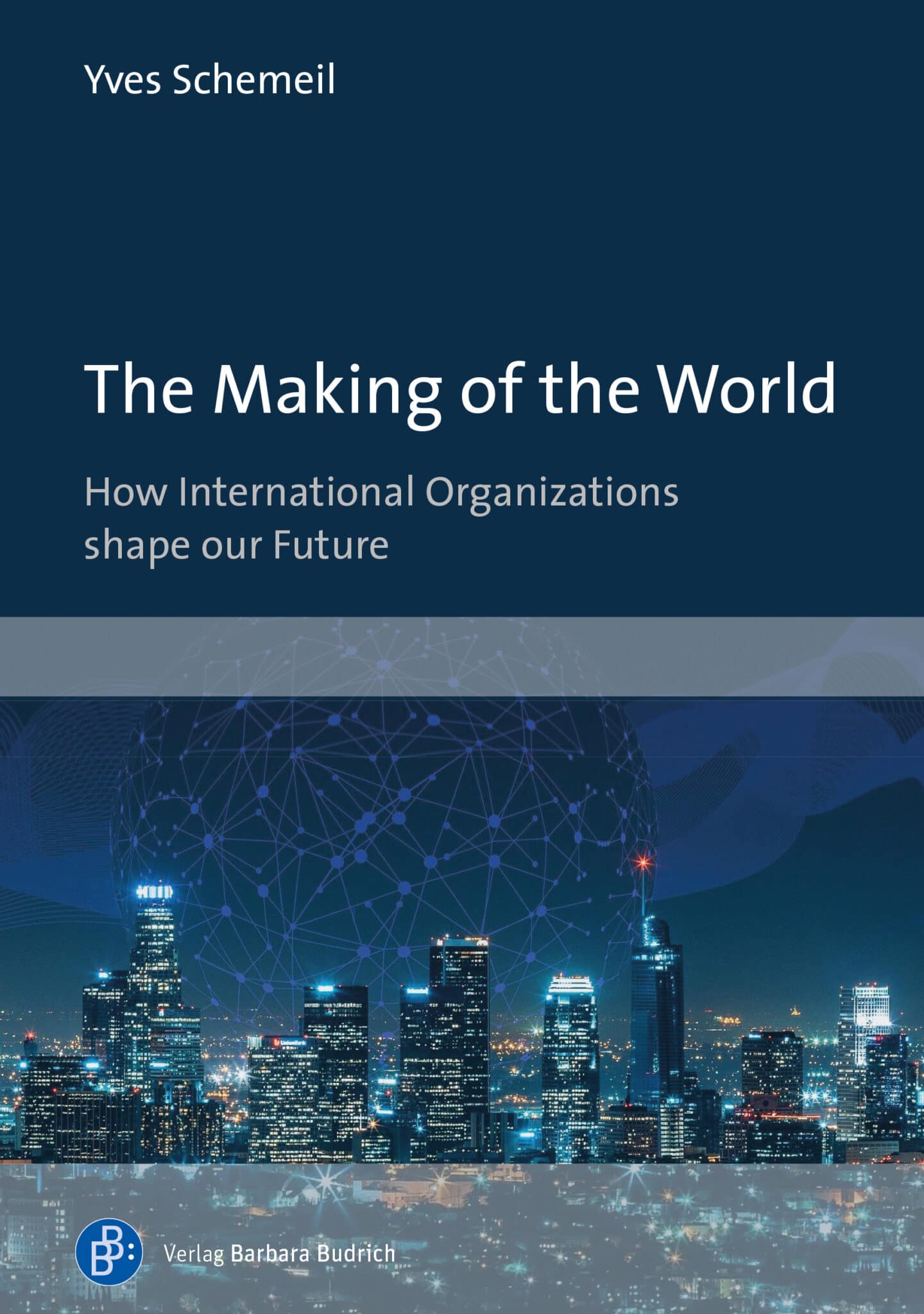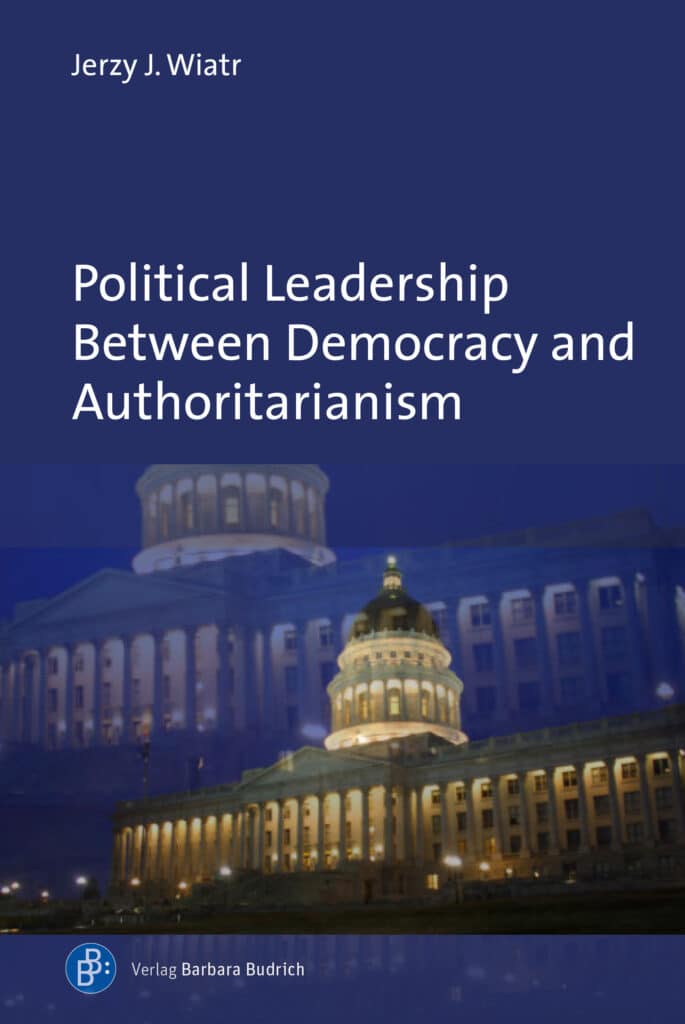Informationen zum Buch
Startseite » Programm » The Making of the World
The Making of the World
How International Organizations Shape Our Future
Erscheinungsdatum : 24.04.2023
40,99 € inkl. MwSt. - 44,90 € inkl. MwSt.
Beschreibung
International Organizations (IOs) were designed to provide global public goods, among which security for all, trade for the richest, and development for the poorest. Their very existence is now a promise of success for the cooperative turn in international relations. Although the IO network was once created by established powers, rising states can hardly resist the massive production of norms that their governments can be reluctant to respect without being able to discard them. IOs are omnipresent, and exert great influence on the world as we know it. However, rulers and ruled are hardly aware of such compelling and snowballing processes. Yves Schemeil uses his in-depth knowledge of IOs to analyze their current impact on international relations, on world politics, and their potential of shaping the global future.
This book fills the gap between actual influence and extant knowledge of IOs; it also assesses the likeliness of an even more intertwined world, in which IOs’ network cannot be disentangled – at least, not as easily as assessed by authoritarian leaders and authoritative authors. The book is based on a sound knowledge of dozens of organizations directly or indirectly observed, either personally or through teams of students in several countries, which made it possible for the author to select the hardest cases to test his hypotheses, and assess the option that we may ever have a world government.
Table of contents + reading sample
The author:
Yves Schemeil is professor emeritus of global and comparative politics and works in Grenoble, France.
http://yves-schemeil.sciencespo-grenoble.fr
Download for free: publicity leaflet (PDF).
The target group:
Researchers and lecturers in political science as well as international organizations and networks
Zusätzliche Information
| Verlag | |
|---|---|
| ISBN | 978-3-8474-2146-7 |
| eISBN | 978-3-8474-1202-1 |
| Format | 14,8 x 21,0 cm |
| Umfang | 406 |
| Erscheinungsjahr | 2023 |
| Erscheinungsdatum | 24.04.2023 |
| Auflage | 1. |
| Sprache | Englisch |
1 Bewertung für The Making of the World
Autor*innen
Schlagwörterdevelopment for the poorest, Geschenk, Global future, global public, global studies, international organziations, international relations, interstate conflicts, IO, IO network, networks, organizations, snowballing processes, trade for the richest, world politics
Pressestimmen
Sociologists Gayl Ness and Steven Brechin once harshly criticized the political science literature on international organizations (IOs) for not understanding IOs as organizations, thus missing the dynamics that take place within and through them. They found little response, but political scientist Yves Schemeil did precisely what the two recommended to bridge the gap. Schemeil’s new approach makes this book completely different from regular IO studies. His book, based on thorough research, is rich in examples from a wide variety of IOs and contains for readers interesting dialogues, debates and excitedly delivered explanations.
Bob Reinalda, Radboud University, The Netherlands
Schemeil nimmt die „Blackbox“ der internationalen Organisation in den Fokus, wobei er sich mehr für Netzwerke und Dynamiken der Kooperation und Institutionalisierung, als auf einzelne Institutionen konzentriert. Hierfür greift er u.a. auf theoretische Ansätze wie das Network Growth Model zurück, bezieht sich aber auch auf langjährige Erfahrungen an und mit internationalen Organisationen.
C3-Bibliothek für Entwicklungspolitik, 09/2023
The book presents a distinctive viewpoint in the field of literature by examining IOs from an internal perspective, considering them as autonomous institutions rather than subordinate institutions to their member states and targeting successful examples contrary to many scholars. I highly recommend the book, particularly to young scholars, as Schemeil provides a comprehensive guide for anyone who is interested in conducting research, composing a thesis, or engaging in academic study on the given topic.
Asiye Gün Güneş Gülal, ULUSLARARASI İLİŞKİLER / INTERNATIONAL RELATIONS, 02/2024
The book is enriched with a wealth of knowledge, anecdotes, and narratives that effectively illustrate and support Schemeil’s arguments, offering a comprehensive and engaging analysis of the pivotal roles international organizations play in the global arena.
Leah Kimber, Swiss Political Science Review (SPSR) / Revue Suisse de Science Politique (RSSP), 09/2024
Beschreibung
Beschreibung
International Organizations (IOs) were designed to provide global public goods, among which security for all, trade for the richest, and development for the poorest. Their very existence is now a promise of success for the cooperative turn in international relations. Although the IO network was once created by established powers, rising states can hardly resist the massive production of norms that their governments can be reluctant to respect without being able to discard them. IOs are omnipresent, and exert great influence on the world as we know it. However, rulers and ruled are hardly aware of such compelling and snowballing processes. Yves Schemeil uses his in-depth knowledge of IOs to analyze their current impact on international relations, on world politics, and their potential of shaping the global future.
This book fills the gap between actual influence and extant knowledge of IOs; it also assesses the likeliness of an even more intertwined world, in which IOs’ network cannot be disentangled – at least, not as easily as assessed by authoritarian leaders and authoritative authors. The book is based on a sound knowledge of dozens of organizations directly or indirectly observed, either personally or through teams of students in several countries, which made it possible for the author to select the hardest cases to test his hypotheses, and assess the option that we may ever have a world government.
Table of contents + reading sample
The author:
Yves Schemeil is professor emeritus of global and comparative politics and works in Grenoble, France.
http://yves-schemeil.sciencespo-grenoble.fr
Download for free: publicity leaflet (PDF).
The target group:
Researchers and lecturers in political science as well as international organizations and networks
Bibliografie
Zusätzliche Information
| Verlag | |
|---|---|
| ISBN | 978-3-8474-2146-7 |
| eISBN | 978-3-8474-1202-1 |
| Format | 14,8 x 21,0 cm |
| Umfang | 406 |
| Erscheinungsjahr | 2023 |
| Erscheinungsdatum | 24.04.2023 |
| Auflage | 1. |
| Sprache | Englisch |
Produktsicherheit
Bewertungen (1)
1 Bewertung für The Making of the World
-
Bewertet mit 5 von 5
Ariatani Wolff –
Was Internationale Organisationen charakterisiert, was sie leisten und warum wir sie heute mehr denn je brauchen
Nach mehrjährigem Politikstudium könnte man meinen, schon eine ganze Menge über Multilateralismus, Diplomatie, Internationale Organisationen (IO) sowie die Bedeutung letztgenannter für Erstgenanntes zu wissen. Dies sollte Studierende der Politikwissenschaft, der Internationalen Beziehungen (IB) und verwandter Studiengänge nicht davon abhalten, zu „The Making of the World“ zu greifen, gelingt es Yves Schemeil doch, neue Perspektiven auf die multidimensionalen Einflussmöglichkeiten von IO zu eröffnen. Lesende profitieren von Vorwissen bezüglich grundlegender IB-Theorien sowie der Genese und Rolle von IO, weshalb es für Studierende in den letzten Zügen ihres Bachelors und höheren Qualifikationsstufen passend erscheint. Als besonders wertvoll für Studierende erweist sich zudem die bündige Zusammenfassung am Ende jedes Kapitels, die das Werk nicht zuletzt zu einem guten Begleiter für universitäre Seminare im Feld der Internationalen Beziehungen macht.
Neben den Kapiteln zur grundlegenden Funktionsweise und Herausforderungen von IO habe ich vor allem den letzten Teil des Werkes mit Gewinn gelesen, werden hier doch mögliche Zukunftsperspektiven diskutiert. Schemeil stellt die sich verschiebenden globalen Kräfteverhältnisse und die Parallelität multipler Krisen, welche die Kooperation innerhalb und die Vermittlung durch IO nötiger denn je machen, überzeugend dar und diskutiert mögliche Reformoptionen in ihrer Struktur, um diesen Herausforderungen künftig erfolgreich(er) begegnen zu können.
Autor*innen
Autor*innen
Schlagwörter
Schlagwörterdevelopment for the poorest, Geschenk, Global future, global public, global studies, international organziations, international relations, interstate conflicts, IO, IO network, networks, organizations, snowballing processes, trade for the richest, world politics
Pressestimmen
Pressestimmen
Sociologists Gayl Ness and Steven Brechin once harshly criticized the political science literature on international organizations (IOs) for not understanding IOs as organizations, thus missing the dynamics that take place within and through them. They found little response, but political scientist Yves Schemeil did precisely what the two recommended to bridge the gap. Schemeil’s new approach makes this book completely different from regular IO studies. His book, based on thorough research, is rich in examples from a wide variety of IOs and contains for readers interesting dialogues, debates and excitedly delivered explanations.
Bob Reinalda, Radboud University, The Netherlands
Schemeil nimmt die „Blackbox“ der internationalen Organisation in den Fokus, wobei er sich mehr für Netzwerke und Dynamiken der Kooperation und Institutionalisierung, als auf einzelne Institutionen konzentriert. Hierfür greift er u.a. auf theoretische Ansätze wie das Network Growth Model zurück, bezieht sich aber auch auf langjährige Erfahrungen an und mit internationalen Organisationen.
C3-Bibliothek für Entwicklungspolitik, 09/2023
The book presents a distinctive viewpoint in the field of literature by examining IOs from an internal perspective, considering them as autonomous institutions rather than subordinate institutions to their member states and targeting successful examples contrary to many scholars. I highly recommend the book, particularly to young scholars, as Schemeil provides a comprehensive guide for anyone who is interested in conducting research, composing a thesis, or engaging in academic study on the given topic.
Asiye Gün Güneş Gülal, ULUSLARARASI İLİŞKİLER / INTERNATIONAL RELATIONS, 02/2024
The book is enriched with a wealth of knowledge, anecdotes, and narratives that effectively illustrate and support Schemeil’s arguments, offering a comprehensive and engaging analysis of the pivotal roles international organizations play in the global arena.
Leah Kimber, Swiss Political Science Review (SPSR) / Revue Suisse de Science Politique (RSSP), 09/2024
Verlag Barbara Budrich
- +49 (0)2171.79491-50
- info@budrich.de
-
Stauffenbergstr. 7
51379 Leverkusen
Deutschland










Ariatani Wolff –
Was Internationale Organisationen charakterisiert, was sie leisten und warum wir sie heute mehr denn je brauchen
Nach mehrjährigem Politikstudium könnte man meinen, schon eine ganze Menge über Multilateralismus, Diplomatie, Internationale Organisationen (IO) sowie die Bedeutung letztgenannter für Erstgenanntes zu wissen. Dies sollte Studierende der Politikwissenschaft, der Internationalen Beziehungen (IB) und verwandter Studiengänge nicht davon abhalten, zu „The Making of the World“ zu greifen, gelingt es Yves Schemeil doch, neue Perspektiven auf die multidimensionalen Einflussmöglichkeiten von IO zu eröffnen. Lesende profitieren von Vorwissen bezüglich grundlegender IB-Theorien sowie der Genese und Rolle von IO, weshalb es für Studierende in den letzten Zügen ihres Bachelors und höheren Qualifikationsstufen passend erscheint. Als besonders wertvoll für Studierende erweist sich zudem die bündige Zusammenfassung am Ende jedes Kapitels, die das Werk nicht zuletzt zu einem guten Begleiter für universitäre Seminare im Feld der Internationalen Beziehungen macht.
Neben den Kapiteln zur grundlegenden Funktionsweise und Herausforderungen von IO habe ich vor allem den letzten Teil des Werkes mit Gewinn gelesen, werden hier doch mögliche Zukunftsperspektiven diskutiert. Schemeil stellt die sich verschiebenden globalen Kräfteverhältnisse und die Parallelität multipler Krisen, welche die Kooperation innerhalb und die Vermittlung durch IO nötiger denn je machen, überzeugend dar und diskutiert mögliche Reformoptionen in ihrer Struktur, um diesen Herausforderungen künftig erfolgreich(er) begegnen zu können.